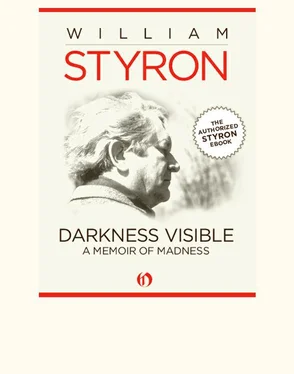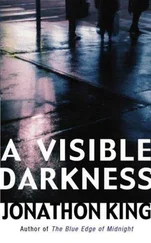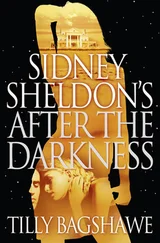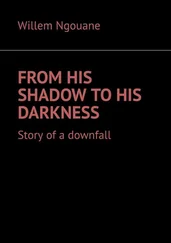William Styron - Darkness Visible
Здесь есть возможность читать онлайн «William Styron - Darkness Visible» весь текст электронной книги совершенно бесплатно (целиком полную версию без сокращений). В некоторых случаях можно слушать аудио, скачать через торрент в формате fb2 и присутствует краткое содержание. Город: New York, Год выпуска: 2010, ISBN: 2010, Издательство: Open Road Integrated Media, Жанр: Биографии и Мемуары, Психология, на английском языке. Описание произведения, (предисловие) а так же отзывы посетителей доступны на портале библиотеки ЛибКат.
- Название:Darkness Visible
- Автор:
- Издательство:Open Road Integrated Media
- Жанр:
- Год:2010
- Город:New York
- ISBN:978-1-936317-29-5
- Рейтинг книги:5 / 5. Голосов: 1
-
Избранное:Добавить в избранное
- Отзывы:
-
Ваша оценка:
- 100
- 1
- 2
- 3
- 4
- 5
Darkness Visible: краткое содержание, описание и аннотация
Предлагаем к чтению аннотацию, описание, краткое содержание или предисловие (зависит от того, что написал сам автор книги «Darkness Visible»). Если вы не нашли необходимую информацию о книге — напишите в комментариях, мы постараемся отыскать её.
Darkness Visible — читать онлайн бесплатно полную книгу (весь текст) целиком
Ниже представлен текст книги, разбитый по страницам. Система сохранения места последней прочитанной страницы, позволяет с удобством читать онлайн бесплатно книгу «Darkness Visible», без необходимости каждый раз заново искать на чём Вы остановились. Поставьте закладку, и сможете в любой момент перейти на страницу, на которой закончили чтение.
Интервал:
Закладка:
This brings up the matter of medication in general. Psychiatry must be given due credit for its continuing struggle to treat depression pharmacologically. The use of lithium to stabilize moods in manic depression is a great medical achievement; the same drug is also being employed effectively as a preventive in many instances of unipolar depression. There can be no doubt that in certain moderate cases and some chronic forms of the disease (the so-called endogenous depressions) medications have proved invaluable, often altering the course of a serious disturbance dramatically. For reasons that are still not clear to me, neither medications nor psychotherapy were able to arrest my plunge toward the depths. If the claims of responsible authorities in the field can be believed—including assertions made by physicians I’ve come to know personally and to respect—the malign progress of my illness placed me in a distinct minority of patients, severely stricken, whose affliction is beyond control. In any case, I don’t want to appear insensitive to the successful treatment ultimately enjoyed by most victims of depression. Especially in its earlier stages, the disease yields favorably to such techniques as cognitive therapy—alone, or in combination with medications—and other continually evolving psychiatric strategies. Most patients, after all, do not need to be hospitalized and do not attempt or actually commit suicide. But until that day when a swiftly acting agent is developed, one’s faith in a pharmacological cure for major depression must remain provisional. The failure of these pills to act positively and quickly—a defect which is now the general case—is somewhat analogous to the failure of nearly all drugs to stem massive bacterial infections in the years before antibiotics became a specific remedy. And it can be just as dangerous.
So I found little of worth to anticipate in my consultations with Dr. Gold. On my visits he and I continued to exchange platitudes, mine haltingly spoken now—since my speech, emulating my way of walking, had slowed to the vocal equivalent of a shuffle—and I’m sure as tiresome as his.
Despite the still-faltering methods of treatment, psychiatry has, on an analytical and philosophical level, contributed a lot to an understanding of the origins of depression. Much obviously remains to be learned (and a great deal will doubtless continue to be a mystery, owing to the disease’s idiopathic nature, its constant interchangeability of factors), but certainly one psychological element has been established beyond reasonable doubt, and that is the concept of loss. Loss in all of its manifestations is the touchstone of depression—in the progress of the disease and, most likely, in its origin. At a later date I would gradually be persuaded that devastating loss in childhood figured as a probable genesis of my own disorder; meanwhile, as I monitored my retrograde condition, I felt loss at every hand. The loss of self-esteem is a celebrated symptom, and my own sense of self had all but disappeared, along with any self-reliance. This loss can quickly degenerate into dependence, and from dependence into infantile dread. One dreads the loss of all things, all people close and dear. There is an acute fear of abandonment. Being alone in the house, even for a moment, caused me exquisite panic and trepidation.
Of the images recollected from that time the most bizarre and discomfiting remains the one of me, age four and a half, tagging through a market after my long-suffering wife; not for an instant could I let out of my sight the endlessly patient soul who had become nanny, mommy, comforter, priestess, and, most important, confidante—a counselor of rocklike centrality to my existence whose wisdom far exceeded that of Dr. Gold. I would hazard the opinion that many disastrous sequels to depression might be averted if the victims received support such as she gave me. But meanwhile my losses mounted and proliferated. There is no doubt that as one nears the penultimate depths of depression—which is to say just before the stage when one begins to act out one’s suicide instead of being a mere contemplator of it—the acute sense of loss is connected with a knowledge of life slipping away at accelerated speed. One develops fierce attachments. Ludicrous things—my reading glasses, a handkerchief, a certain writing instrument—became the objects of my demented possessiveness. Each momentary misplacement filled me with a frenzied dismay, each item being the tactile reminder of a world soon to be obliterated.
November wore on, bleak, raw and chill. One Sunday a photographer and his assistants came to take pictures for an article to be published in a national magazine. Of the session I can recall little except the first snowflakes of winter dotting the air outside. I thought I obeyed the photographer’s request to smile often. A day or two later the magazine’s editor telephoned my wife, asking if I would submit to another session. The reason he advanced was that the pictures of me, even the ones with smiles, were “too full of anguish.”
I had now reached that phase of the disorder where all sense of hope had vanished, along with the idea of a futurity; my brain, in thrall to its outlaw hormones, had become less an organ of thought than an instrument registering, minute by minute, varying degrees of its own suffering. The mornings themselves were becoming bad now as I wandered about lethargic, following my synthetic sleep, but afternoons were still the worst, beginning at about three o’clock, when I’d feel the horror, like some poisonous fogbank, roll in upon my mind, forcing me into bed. There I would lie for as long as six hours, stuporous and virtually paralyzed, gazing at the ceiling and waiting for that moment of evening when, mysteriously, the crucifixion would ease up just enough to allow me to force down some food and then, like an automaton, seek an hour or two of sleep again. Why wasn’t I in a hospital?
VI
FOR YEARS I HAD KEPT A NOTEBOOK—NOT STRICTLY a diary, its entries were erratic and haphazardly written—whose contents I would not have particularly liked to be scrutinized by eyes other than my own. I had hidden it well out of sight in my house. I imply no scandalousness; the observations were far less raunchy, or wicked, or self-revealing, than my desire to keep the notebook private might indicate. Nonetheless, the small volume was one that I fully intended to make use of professionally and then destroy before the distant day when the specter of the nursing home came too near. So as my illness worsened I rather queasily realized that if I once decided to get rid of the notebook that moment would necessarily coincide with my decision to put an end to myself. And one evening during early December this moment came.
That afternoon I had been driven (I could no longer drive) to Dr. Gold’s office, where he announced that he had decided to place me on the antidepressant Nardil, an older medication which had the advantage of not causing the urinary retention of the other two pills he had prescribed. However, there were drawbacks. Nardil would probably not take effect in less than four to six weeks—I could scarcely believe this—and I would have to carefully obey certain dietary restrictions, fortunately rather epicurean (no sausage, no cheese, no pâté de foie gras), in order to avoid a clash of incompatible enzymes that might cause a stroke. Further, Dr. Gold said with a straight face, the pill at optimum dosage could have the side effect of impotence. Until that moment, although I’d had some trouble with his personality, I had not thought him totally lacking in perspicacity; now I was not at all sure. Putting myself in Dr. Gold’s shoes, I wondered if he seriously thought that this juiceless and ravaged semi-invalid with the shuffle and the ancient wheeze woke up each morning from his Halcion sleep eager for carnal fun.
Читать дальшеИнтервал:
Закладка:
Похожие книги на «Darkness Visible»
Представляем Вашему вниманию похожие книги на «Darkness Visible» списком для выбора. Мы отобрали схожую по названию и смыслу литературу в надежде предоставить читателям больше вариантов отыскать новые, интересные, ещё непрочитанные произведения.
Обсуждение, отзывы о книге «Darkness Visible» и просто собственные мнения читателей. Оставьте ваши комментарии, напишите, что Вы думаете о произведении, его смысле или главных героях. Укажите что конкретно понравилось, а что нет, и почему Вы так считаете.












